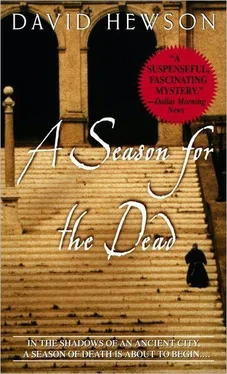David Hewson - A Season for the Dead
Здесь есть возможность читать онлайн «David Hewson - A Season for the Dead» весь текст электронной книги совершенно бесплатно (целиком полную версию без сокращений). В некоторых случаях можно слушать аудио, скачать через торрент в формате fb2 и присутствует краткое содержание. Жанр: Старинная литература, на английском языке. Описание произведения, (предисловие) а так же отзывы посетителей доступны на портале библиотеки ЛибКат.
- Название:A Season for the Dead
- Автор:
- Жанр:
- Год:неизвестен
- ISBN:нет данных
- Рейтинг книги:3 / 5. Голосов: 1
-
Избранное:Добавить в избранное
- Отзывы:
-
Ваша оценка:
- 60
- 1
- 2
- 3
- 4
- 5
A Season for the Dead: краткое содержание, описание и аннотация
Предлагаем к чтению аннотацию, описание, краткое содержание или предисловие (зависит от того, что написал сам автор книги «A Season for the Dead»). Если вы не нашли необходимую информацию о книге — напишите в комментариях, мы постараемся отыскать её.
A Season for the Dead — читать онлайн бесплатно полную книгу (весь текст) целиком
Ниже представлен текст книги, разбитый по страницам. Система сохранения места последней прочитанной страницы, позволяет с удобством читать онлайн бесплатно книгу «A Season for the Dead», без необходимости каждый раз заново искать на чём Вы остановились. Поставьте закладку, и сможете в любой момент перейти на страницу, на которой закончили чтение.
Интервал:
Закладка:
“No. Not at all. I just like to look for meanings. It’s a hobby.”
A couple of tourists turned on the light for an adjoining painting.
It was brightness and shade again, Rossi noticed, but there was more action in this one. Some old guy was lying on the floor, dying, a madman over his body, holding a bloodied sword. There was something deeply disturbing about the work. It was dense, vivid, savage. It seemed poised on the very edge of sanity.
“Matthew’s martyrdom,” Costa said quietly. “Another story. For another time.”
“I never did work out why a religion based around love and peace seemed to involve so much killing,” Rossi grumbled. “You know the answer to that? Or do you need to be a Catholic to understand?”
“It’s about martyrdom. Sacrificing yourself for something bigger than one human being. Could be the Church. For my dad it could be the hammer and sickle.”
“Sounds the kind of thing dumb people do,” Rossi mumbled, then wiped his sleeve across his mouth.
Costa knew what the gesture meant. Rossi wanted a beer. He followed the big man outside, watched him working out where to go next.
“Listen.” Rossi’s watery eyes hooded over. “If you want to hear more about this I’ve an idea.”
“Really?”
“Yeah. We’re having dinner with Crazy Teresa tonight. It could be useful.”
“We? We have a date with Crazy Teresa?”
Rossi eyed him as if to say: So what?
“We hardly know each other,” Costa objected.
“It’s Crazy Teresa. Everybody knows her.”
“I meant we hardly know each other.”
Rossi seemed offended by that. “Look. I know this relationship didn’t get off to the greatest of starts. But I’m trying here, kid. I’m doing my best. And there is something in it too. She wants to talk. I know the rumors doing the rounds. There’s a touch of truth in them but it’s not gone as far as people think. I’m not eating with Crazy Teresa on my own, not tonight.”
Costa couldn’t believe his ears. “Jesus. Why should I be there?”
“She wants you. Don’t ask me why. It’s only polite. Interdepartmental relations and all that.”
“Wonderful.”
Costa couldn’t work up much enthusiasm to complain. He had nothing else to do. Maybe Crazy Teresa off duty would be a different woman.
“Is that a yes?”
“Depends,” Costa said slyly. “Are we still negotiating?”
Seven
Sara Farnese lived in the Borgo, the residential area that led from the river to the very walls of the Vatican. This was still Rome, still under the jurisdiction of the city. Yet it was impossible to ignore the proximity of the papal state up the hill. Her home was in Vicolo delle Palline, a narrow cobbled lane that ran between the Via dei Corridori and the Borgo Pio. Il Pasette, the elevated, fortified corridor which joined the Vatican with the Pope’s former fortress, the Castel Sant’Angelo, abutted her medieval, ochre-colored building.
When parties of visiting luminaries were allowed to walk down the passage, treading in the footsteps of long-dead pontiffs sometimes fleeing for their lives, she could hear them through the wall and listen to their idle chatter. The commercial bustle of St. Peter’s Square and the hectic tourist trade around it were only minutes away, but in the little street and the close, narrow lanes she favored, people moved at a different pace. This was still a local quarter, residential, largely untouched by the modernization of the city.
Homes were handed down from generation to generation—though not hers, which had been bought at a substantial price.
She had acquired the second-floor apartment four years before when she finally moved to Rome for good at the age of twenty-three, putting on the professional suit of a university lecturer and, shortly after, starting to look older, perhaps more serious, than she felt. College, in London and America, was now a fading memory.
Her teenage years, spent in boarding schools throughout Europe and finally in the cold Swiss town of Montreux, seemed remote, as if they had happened to another person. She remembered boarding the steamer and meandering the great, shining expanse of Lake Geneva on her own, trying to escape the prying attention of classmates who found her distant, different. She would sit on deck for hours, overlooked by nothing except the towering crown of mountains bordering the eastern end of the glittering inland sea, peering down at her from high, like God from Heaven: some vast, omnipresent watcher over her life, detached from its emotionless daily tedium.
These were Sara Farnese’s most vivid memories, ones of physical, geographical objects: The green at Harvard. The college quadrants of Oxford. A handful of ancient streets behind the Blue Mosque in Istanbul where she could lose herself for hours, following the tangled history of Byzantium, imagining herself into its formative years under Constantine, realizing that the study of early Christianity, the subject she had chosen—or had it chosen her, she was unsure which—was one where she had a certain, distinct talent.
There were few people stored in the dark vault hidden within her head.
An exception lay in one of the oldest memories of all: Sister Annette, in the convent kindergarten in Paris, taking her to one side on a sunny June morning. This was twenty-two years ago. Yet, seated now in the apartment in the Borgo, she could still recall the nun’s gaunt, worried face, framed by a starched white wimple, like a picture waiting to be hung on the wall.
They had gone to a small room Sara had never visited before. The bright sunlight filtered through a single stained-glass window depicting Jesus with a lamb in His arms. The plangent clatter of the bells of St. Eustache drifted into the room, together with the racket of a reggae band busking outside the Les Halles shopping complex. The place smelled of dust, as if it were little used, though it was as clean, and as simple, as every other corner of the convent. They sat next to each other on hard wooden chairs, with their hands joined together around an old, battered Bible.
Sister Annette was not as old as she looked, the child Sara thought.
Sometimes she imagined the nun’s face without the wrinkles, without the tension which seemed to come from some inwardly felt pain.
Without the wimple and the habit too, dressed in normal clothes, like the people she saw on the street. When Sara did this, Sister Annette became a different person: full of life, vibrant, restless. Normal somehow. This imaginary person and the real Sister who now sat next to her shared only one identical feature. They both had very bright, very intense blue eyes and, on this long-dead Paris day, the real Annette turned them on the infant Sara with a fierce, unbending power which gave the child no room for escape.
Memories were about generalities, not details. Even the child Sara had understood this and never tried to fix each word precisely in her head. It was the meaning which counted and in that, said the nun’s eyes, there could be no room for mistakes.
They had spoken about the mysteries of God and how no one, not even the greatest human being who has ever lived, could begin to understand everything in His mind. Not Sister Annette. Not the kindly priest with the foreign accent who came into the convent from time to time, gave them talks Sara could not understand, then left, touching each child on the head as he walked to the front door and the bright world beyond.
Even the Holy Father himself was outside every last detail of God’s great plan, Sister Annette said, which surprised the child Sara greatly since she had been given to understand that the distant white figure who lived in the Vatican was, in some unexplained way, part of Heaven itself.
Читать дальшеИнтервал:
Закладка:
Похожие книги на «A Season for the Dead»
Представляем Вашему вниманию похожие книги на «A Season for the Dead» списком для выбора. Мы отобрали схожую по названию и смыслу литературу в надежде предоставить читателям больше вариантов отыскать новые, интересные, ещё непрочитанные произведения.
Обсуждение, отзывы о книге «A Season for the Dead» и просто собственные мнения читателей. Оставьте ваши комментарии, напишите, что Вы думаете о произведении, его смысле или главных героях. Укажите что конкретно понравилось, а что нет, и почему Вы так считаете.












